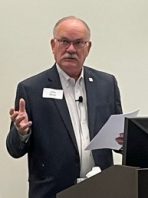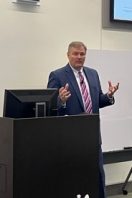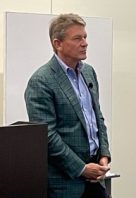
“Business Engagement” is theme of Friday workshop hosted by UT’s Spark Innovation Center
 By Tom Ballard, Chief Alliance Officer, PYA
By Tom Ballard, Chief Alliance Officer, PYA
Friday’s “Business Engagement” workshop hosted by the University of Tennessee’s (UT) Spark Innovation Center featured a smorgasbord of solid content for the 40 or so individuals, many local entrepreneurs, who attended the four-hour session either in-person or remotely.
Speakers included UT President Randy Boyd, who shared his very successful entrepreneurial journey with a company that he recently sold, and PYA President and Chief Executive Officer Marty Brown, who talked about how strategic partnerships have helped grow the Knoxville-headquartered, national professional services firm.
 The event was moderated by John Bruck (pictured right), Director of the Spark Innovation Center, who is known throughout the region as an active and valuable mentor to many start-ups. Other speakers included: (1) Chris Trump with the law firm of Egerton, McAfee, Armistead and Davis; (2) Gary Rawlings, a Consultant, Mentor and Advisor to start-ups including those at the “Innovation Crossroads” program operated by Oak Ridge National Laboratory; and (3) Jean-Louis Stasi, Senior Vice President at Schneider Electric and overseers of the company’s “at the Edge” program that invests in new ideas, emerging technologies and business models that both challenge and complement Schneider Electric’s activities. He joined virtually from Boston.
The event was moderated by John Bruck (pictured right), Director of the Spark Innovation Center, who is known throughout the region as an active and valuable mentor to many start-ups. Other speakers included: (1) Chris Trump with the law firm of Egerton, McAfee, Armistead and Davis; (2) Gary Rawlings, a Consultant, Mentor and Advisor to start-ups including those at the “Innovation Crossroads” program operated by Oak Ridge National Laboratory; and (3) Jean-Louis Stasi, Senior Vice President at Schneider Electric and overseers of the company’s “at the Edge” program that invests in new ideas, emerging technologies and business models that both challenge and complement Schneider Electric’s activities. He joined virtually from Boston.
“Strategic partnerships have been invaluable to our growth,” Brown told the attendees. Today, PYA, the power behind teknovation.biz, is ranked consistently by Modern Healthcare among the Top 20 healthcare consulting firms in the U.S. and one of the Top 100 largest accounting firms in the U.S. by INSIDE Public Accounting.
To set the stage for his remarks, Brown defined strategic partnerships as something that is “accomplished when two, or more, unique separately governed entities align, collaborate, cooperate, jointly venture, or otherwise combine efforts towards a common goal or purpose, usually in a mutually beneficial way.”
 Noting that PYA “punches above our weight” and the brand is better known in many markets outside of Knoxville than it is locally, Brown (pictured left) said it is because of strategic partnerships that the firm has developed. They include organizations like the American Health Law Association, where PYA is the national sponsor of its educational activities, and Physicians Insurance of Seattle that is sharing PYA’s thought leadership content with its thousands of members.
Noting that PYA “punches above our weight” and the brand is better known in many markets outside of Knoxville than it is locally, Brown (pictured left) said it is because of strategic partnerships that the firm has developed. They include organizations like the American Health Law Association, where PYA is the national sponsor of its educational activities, and Physicians Insurance of Seattle that is sharing PYA’s thought leadership content with its thousands of members.
“You are looking for difference makers (because) sometimes you cannot do it on your own,” he explained. “Strategic partners are a means to an end,” allowing companies to compete through new distribution channels or partners.
He also cited local partnerships, starting with the Spark Innovation Center, “Innovation Crossroads,” and the UT, Knoxville Haslam College of Business which is a key recruiting source for talent for PYA.
While Brown is clearly a fan of strategic partnerships, he also advised caution in making such decisions. “You need to make sure your strategic partner is a good fit,” he told the attendees, adding, “Make sure your strategic partner is respected, and they respect you.” Brown also noted the importance of avoiding what he termed “brand blemish” and negotiating terms that protect your brand if you need to terminate the partnership at a later date.
“It is not a strategic partnership until it is mutually aligned and mutually beneficial,” he explained.
Brown also highlighted PYA’s emphasis on the word HELP as a driving philosophy for being engaged with organizations like Spark and “Innovation Crossroads” and the start-ups that are involved in the two initiatives.
 During his presentation right after lunch, Boyd (pictured left listening to a question) talked about his own experience including his first start-up that went nowhere. “It’s good to get a failure out early,” he said. Another “Boyd truism” was something that is frequently hammered into new entrepreneurs such as the I-Corps South program that culminates on Friday.
During his presentation right after lunch, Boyd (pictured left listening to a question) talked about his own experience including his first start-up that went nowhere. “It’s good to get a failure out early,” he said. Another “Boyd truism” was something that is frequently hammered into new entrepreneurs such as the I-Corps South program that culminates on Friday.
“If you listen to your customers long enough, they’ll tell you what you really need to hear,” Boyd advised. He also emphasized for other points: (1) have an inspiring mission which he described as something that “lives between the probable and impossible”; (2) have a strategy to get there; (3) surround yourself with great people . . . “hire smart and hard”; and (4) have a set of values and an acronym that captures them in no more than seven letters.
To illustrate the final point, Boyd cited the “Be One UT” acronym that describe the UT System values.
Like what you've read?
Forward to a friend!

